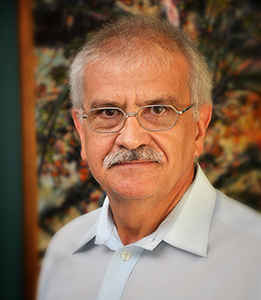Latest News Archive
Please select Category, Year, and then Month to display items
12 January 2024
|
Story Nonsindiswe Qwabe
|
Photo Sonia Small
 Since joining the UFS in 2008, Dr Grey Magaiza has worked extensively on approaches that can foster the socio-economic transformation of societies.
Since joining the UFS in 2008, Dr Grey Magaiza has worked extensively on approaches that can foster the socio-economic transformation of societies.
“The future should be one where communities can decide on their development agenda and futures. That’s the most important for me.” Dr Grey Magaiza, Deputy Director of the Centre for Gender and Africa Studies (CGAS) and Head of the Community Development programme on the Qwaqwa Campus, is passionate about capacitating communities to be agents of change and advancement. His vision for the future emphasises the empowerment of communities to take charge of their development by actively participating in decision making and the implementation of development projects that can improve their lives.
Since joining the UFS in 2008, Dr Magaiza has worked extensively on approaches that can foster the socio-economic transformation of societies. Over the years, he has crafted his research speciality into one that he is most proud of – being an interdisciplinary scientist immersed in the development of communities.
“I’m in a fortunate position of researching what I like. I say ‘fortunate’, because I’ve taken the time to understand what I’m passionate about, which is the overall field of rural livelihoods and livelihood futures – in short, community development. My research starts from an engaged university, understanding the elements that a university must use to enhance transformation and relevance to its immediate community in terms of development.”
One of the ways he has done this is by looking at social entrepreneurship as a development approach for young people in a rural setting. Through workshops with non-profit and civic organisations in Qwaqwa, Dr Magaiza has been helping these organisations to map out their needs and actively meet them through the involvement and support of external role players.
“We understand that communities are part of the national development agenda, but even that national agenda respects community knowledge and intentions and allows communities to shape their identity. A critical enabler of this is community organising. You bring back the capacity in communities to have dialogues on issues affecting them as spaces for engagement, knowledge exchange, and for people to just talk about their way forward.”
By enabling communities to define their development agenda, they can address their specific needs, challenges, and aspirations, he said. “When I look at livelihood futures, it’s quite an exciting aspect of my work – it’s like looking into a fortune tellers’ globe, because you’re not deciding for communities what they should do, but the communities themselves take those decisions.”
National Department of Health invests R53.5 million in UFS laboratory
2016-02-04

Dr Derek Litthauer
Photo: Supplied |
This year has started off on a high note for Dr Derek Litthauer and his team at the South African National Control Laboratory (NCL) for Biological Products. The National Department of Health has awarded the NCL a contract to the value of R53.5 million to continue testing vaccines for the next three years.
Vaccines are biological medicines used to ensure healthy populations by preventing many diseases. The World Health Organization (WHO) estimates that, worldwide, about 5.2 million children under six years old die annually. Of these deaths, 29% are vaccine preventable. Research has revealed that vaccines prevent about 6 million deaths each year globally. Safe and effective vaccines are essential public health tools, which are strictly regulated internationally. It is the NCL’s responsibility to perform quality control testing on all vaccines to be used on humans in South Africa.
This laboratory, the only one of its kind in Africa, receives samples of vaccines from manufacturers and importers for rigorous evaluation and testing. No vaccine may be used in South Africa without a release certificate issued by the Control Lab, certifying that the vaccine is suitable for human use.
The contract is a commitment to ensuring that only vaccines of the highest quality are used in South Africa.